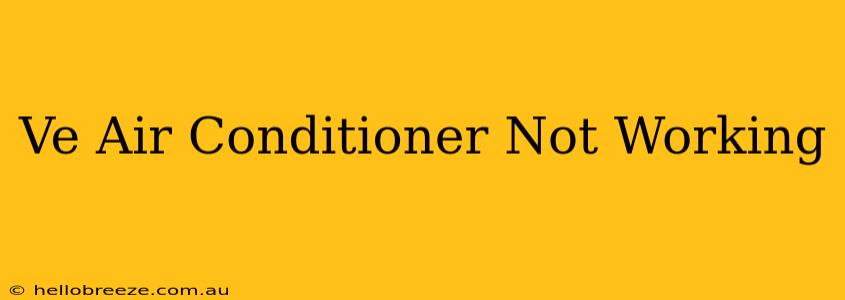Is your VE air conditioner refusing to cooperate on a hot day? A malfunctioning AC unit can be incredibly frustrating, leaving you sweating and uncomfortable. This comprehensive guide will walk you through troubleshooting common VE air conditioner problems, helping you diagnose the issue and potentially fix it yourself before calling a technician.
Common Reasons Why Your VE Air Conditioner Isn't Working
Several factors can cause your VE air conditioner to malfunction. Let's explore some of the most frequent culprits:
1. Power Issues: The Simplest Fix
Before diving into complex repairs, check the basics:
- Is the power cord plugged in securely? This might seem obvious, but a loose connection is a surprisingly common cause of AC failure.
- Is the circuit breaker tripped? Check your home's breaker box for a tripped breaker related to your air conditioner. Reset it by flipping the switch off and then back on.
- Is there a power outage? A simple power outage can stop your AC from working. Check your other appliances to confirm.
2. Thermostat Troubles: A Common Culprit
Your thermostat acts as the brain of your AC system. Problems here are frequently the source of the issue:
- Check the thermostat batteries: If your thermostat is battery-powered, low or dead batteries can prevent it from functioning correctly. Replace them if needed.
- Is the thermostat set correctly? Make sure the thermostat is set to "cool" and that the temperature is set lower than the current room temperature.
- Clean the thermostat: Dust and debris can interfere with the thermostat's operation. Gently clean it with a soft cloth.
- Try a thermostat reset: Some thermostats have a reset button. Locate it and press it to see if that resolves the problem.
3. Refrigerant Leaks: A Serious Issue
Low refrigerant levels are a serious problem requiring professional attention. Do not attempt to handle refrigerant yourself, as it can be dangerous. Signs of a refrigerant leak include:
- Weak airflow: If the air blowing from your vents is weak or barely noticeable, this could signal a refrigerant leak.
- Frozen evaporator coil: Ice buildup on the evaporator coil is another indicator of a potential refrigerant problem.
- Strange noises: Unusual hissing or bubbling sounds could point towards a refrigerant leak.
If you suspect a refrigerant leak, contact a qualified HVAC technician immediately.
4. Dirty Air Filter: Easy Fix, Big Impact
A clogged air filter restricts airflow, forcing your AC unit to work harder and potentially leading to overheating and failure.
- Locate and remove your air filter: The location of your air filter varies depending on your VE AC model. Consult your owner's manual if needed.
- Inspect the filter: If the filter is dirty or clogged, replace it with a new one. Regular filter changes are crucial for optimal performance and extended lifespan.
5. Frozen Evaporator Coil: Addressing Ice Buildup
Ice on the evaporator coil can be caused by several factors, including:
- Low refrigerant: As mentioned earlier, refrigerant leaks can lead to freezing.
- Dirty air filter: A clogged filter restricts airflow and causes freezing.
- Blocked airflow: Obstructions around the unit can also cause freezing.
To address this, you may need to defrost the coil, but proceed with caution and consult your owner's manual or a professional if you're unsure.
When to Call a Professional
While some problems are easily solved with simple troubleshooting, others require the expertise of a qualified HVAC technician. Contact a professional if:
- You suspect a refrigerant leak.
- You notice unusual noises coming from the unit.
- The problem persists after trying basic troubleshooting steps.
- You're uncomfortable working with electrical components or potentially dangerous parts.
By carefully following these troubleshooting steps, you can often pinpoint the cause of your VE air conditioner's malfunction. Remember, safety is paramount, and if you are unsure about any repair, it's always best to call a qualified professional. Staying cool and comfortable is worth the investment!

